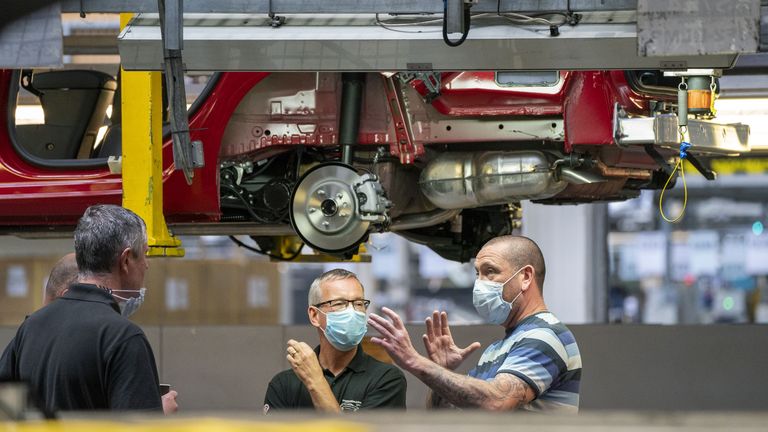Sunak warns of ‘bumps on road’ as figures show growth stalled even before arrival of Omicron variant
Chancellor Rishi Sunak has warned of “bumps on our road to recovery” as new figures showed growth stalled even before the arrival of the Omicron variant.
GDP grew by just 0.1% in October, well short of the 0.4% expected by economists and a big slowdown on September’s 0.6% expansion, the Office for National Statistics (ONS) said.
The data showed evidence of a summer dining-out spree petering out as well as the beleaguered construction sector struggling with supply chain delays.
Experts fear that new “Plan B” COVID restrictions could pour further cold water on the recovery – with the ONS figures suggesting GDP in October was still 0.5% short of pre-pandemic levels in February 2020.
Mr Sunak said: “We’ve always acknowledged there could be bumps on our road to recovery, but the early actions we have taken, our ongoing £400bn economic support package and our vaccine programme mean we are well placed to keep our economy on track.
“We have still been recovering quicker than expected, with more employees on payrolls than ever before and redundancies remaining low.”
The figures look likely to further dampen expectations that the Bank of England could hike interest rates next week to try to tackle cost of living increases.
Maike Currie, investment director at Fidelity International, said rising inflation and the spread of Omicron might send the economy into contraction.
“The Bank of England will be acutely aware that it’s harder to dig an economy out of recession than to cool rising
inflation, which makes an interest rate rise next week increasingly unlikely,” she said.
The ONS data for October pointed to a sharp fall in construction output as builders face higher costs and delays in the supply of materials such as steel, glass, concrete and timber.
There was also a decline in restaurants after a strong summer, with a 7.5% fall in food and beverage services activities.
Industrial output was hit by big falls in electricity and gas as well as mining and quarrying while the manufacturing sector flat-lined as it struggled with supply chain problems and staff shortages.
Growth was largely driven by a rise in face-to-face GP appointments as well as second-hand car sales and employment agencies – at a time when new cars as well as workers in some sectors have become hard to find.
The services sector, which represents four-fifths of economic output and ranges from pubs and hotels to law firms and accountants, recovered to pre-pandemic levels for the first time, though the consumer-facing part of the sector remains 5.2% short.
Alpesh Paleja, lead economist at the CBI, said: “Growth disappointed in October, reinforcing concerns about the resilience of the UK’s economic recovery to the Omicron variant and the impact of further restrictions.
“We need to create consistency in our approach and build confidence by reducing the oscillation between normal life and restrictions as we learn to live with the virus and its variants.”
Source: Read Full Article




